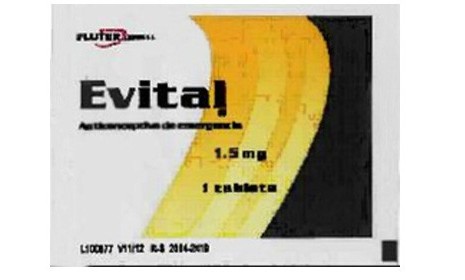Evital: The 'fake' contraceptive?
A phony morning-after pill, not approved by the FDA and circulating via online pharmacies and dealers, may be useless — or even dangerous

A free daily email with the biggest news stories of the day – and the best features from TheWeek.com
You are now subscribed
Your newsletter sign-up was successful
The FDA is warning consumers to avoid a "fake" contraceptive known as Evital which it discovered earlier this week. The drug, sold as a "morning-after" emergency contraceptive on online pharmacy sites and by individual dealers, is believed to be ineffective at preventing pregnancy and may contain potentially harmful compounds. The FDA is urging women not to take the pills, and to contact the FDA via email if they have any of the counterfeit pills. Here's what you need to know:
How can anyone spot a phony contraceptive?
By the name, in this case. There are only three brands of morning-after contraceptives approved for use in the United States: Next Choice, Ella, and Plan B One-Step. These are available over-the-counter in many pharmacies, and with a prescription for women under the age of 16. The boxes of Evital, which is not approved for use in the United States, were discovered through routine inspections of imported goods.
The Week
Escape your echo chamber. Get the facts behind the news, plus analysis from multiple perspectives.

Sign up for The Week's Free Newsletters
From our morning news briefing to a weekly Good News Newsletter, get the best of The Week delivered directly to your inbox.
From our morning news briefing to a weekly Good News Newsletter, get the best of The Week delivered directly to your inbox.
How do people get access to counterfeit drugs?
Online pharmacies have made it easy to sell fake medicine. Also, some drugs like contraceptives are sold within certain communities person-to-person. Though the FDA says it doesn't have hard evidence that any particular ethnic group is being targeted by those selling Evital, it seems these bogus emergency contraceptives have been distributed within Hispanic communities in boxes labeled "Anticonceptivo de emergencia."
How common are issues with counterfeit pills?
Counterfeit drugs of all types are circulating worldwide, especially via the internet. Some contain no active ingredient, while others may be contaminated and potentially dangerous. In 2004, the FDA took action against phony contraceptive patches available from an overseas internet pharmacy — the patches contained no ingredients that would prevent pregnancy.
A free daily email with the biggest news stories of the day – and the best features from TheWeek.com
Sources: CNN, FDA, Huffington Post, TIME
-
 The environmental cost of GLP-1s
The environmental cost of GLP-1sThe explainer Producing the drugs is a dirty process
-
 Greenland’s capital becomes ground zero for the country’s diplomatic straits
Greenland’s capital becomes ground zero for the country’s diplomatic straitsIN THE SPOTLIGHT A flurry of new consular activity in Nuuk shows how important Greenland has become to Europeans’ anxiety about American imperialism
-
 ‘This is something that happens all too often’
‘This is something that happens all too often’Instant Opinion Opinion, comment and editorials of the day